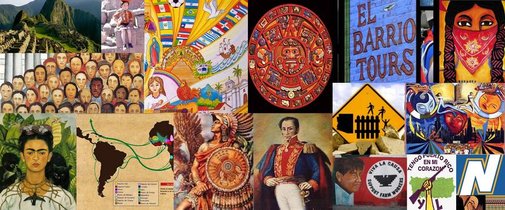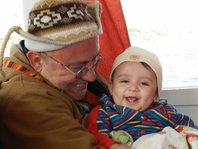 I recently turned 50 years old and have been living in the U.S. for the past 32 years, ever since my family and I fled our native El Salvador as political refugees. Although a virulent civil war was raging at the time, our flight was also a result of the consequences of my sexuality and age, an 18 year old gay man in a country where homosexuals were ‘disappeared’ along with thousands of others who were seen as being somehow subversive to the established right-wing patriarchy and its death squads. Only recently, largely as a result of earning my master’s degree in Latin American Studies at the University of XXXX, have I looked back creatively and analytically to synthesize and express the trauma that I experienced as a young gay man as a result of my sexual orientation.
I recently turned 50 years old and have been living in the U.S. for the past 32 years, ever since my family and I fled our native El Salvador as political refugees. Although a virulent civil war was raging at the time, our flight was also a result of the consequences of my sexuality and age, an 18 year old gay man in a country where homosexuals were ‘disappeared’ along with thousands of others who were seen as being somehow subversive to the established right-wing patriarchy and its death squads. Only recently, largely as a result of earning my master’s degree in Latin American Studies at the University of XXXX, have I looked back creatively and analytically to synthesize and express the trauma that I experienced as a young gay man as a result of my sexual orientation.
I now hope to spend the balance of my life writing about issues of gender repression, sexuality, and male homosexual identity—especially the way in which homosexuality has been traditionally repressed in Latin America, both as a way of life and as a subject for literature. I want to record and analyze the evolution of voices that are rising in protest and expressing outrage at the violence , publishing those voices in solidarity with the struggle for progressive change, healing, consolation, and greater understanding among ourselves and from our communities. My master’s thesis on this subject was well received and I am increasingly being sought after as a public speaker in academic circles concerning the subject of violence and discrimination against the LGBT community in Latin America. In April of this year I had the opportunity to present at the 13th Annual South Florida Latin American and Caribbean Studies Conference at XXXX University, where I was awarded a first prize in the area of History and Identity in Latin America. A month later, I participated in the 3rd National Symposium of the Stonewall National Education Project where I was invited to speak about the coming out experiences of gay males in the context of living in a violent society. Later in the summer I was invited to present portions of my thesis at the Gay, Lesbian, Bisexual, Transgender and Straight Alliance (GLBTSA) at the University of XXXX in Chapel Hill. This/Next December, I will be the keynote presenter at the Stonewall National Museum and Archives, in Fort Lauderdale, FL, where my thesis has played a supportive role in their current national exhibition “XXXX.”
My world lit up like a pinball machine in the summer of 2012 when I was selected to work as an intern in the Office of the Inter-American Commission on Human Rights (IACHR) at the Organization of American States, in Washington D.C., working on projects and initiatives to promote and protect the human rights of LGBTI people throughout the American hemisphere. I helped process petitions and managed cases related to precautionary measures involving sexual orientation, gender identity, and gender expression among OAS Member States. I also helped to monitor human rights violations of LGBTI persons in the Americas, promoting their visibility in the literature and materials developed by the OAS and sent to its Member States. My summer intern opportunity at IACHR has been complemented by my volunteer work at the XXXX Institute in Coral Gables, Florida, working to prevent suicide through gender-orientation education. This experience also provided me with great inspiration and impetus for my master’s thesis on the LGBTI community of XXXX, specifically gay men born before and after the Civil War of the 1980s.
Entitled “Sexuality and Trauma in Modern XXXX: An Autoethnography,” my thesis offeres a powerful, intimate and detailed analysis of the testimonios of gay men in El Salvador where despite massive amounts of societal discrimination, hate, abuse, violence and abandonment by family members, marginalization generated by a governmental institutions that still interpret homosexuality as a psychological sickness and a flawed relationship with religious establishments that continue to view homosexuality as a perversion, and homosexual people as socially defective and morally degenerate the LGBTI people have found ways to cope and prevail. My own story, supported by the testimonies of others in similar circumstances, helps to provide a rich foundation for a detailed autoethnographical analysis, complete with rich historical background of both the pre and post-civil war eras in El Salvador, so as to provide adequate context for the principal life histories of three gay men who still live in El Salvador. Along with them, through their stories of lives disrupted by war and crippled by street violence, I take a close look at the way that sexual violence, social unacceptance, and family hostility resulted in additional challenges to their mental health. I have worked towards research that is most compelling, and intimate, an influential piece of advise from Dr. XXXX at the University of XXXX who is a leading force in the area of “anthropology that breaks your heart.”
A consensus seems to have emerged both among my faculty advisors as well as my heart that I should continue with my research, go on to the next stage and earn a PhD Degree, and that I should continue to do so at the University of XXXXi in the Department of Modern Languages and Literatures. I love how the Romance Studies Program at UM is so interdisciplinary, with students encouraged to study a wide range of interrelated topics spanning, in particular, Latin American Studies, Romance Languages, History, Anthropology and Sociology, while at the same time they develop a strong theoretical background that will be used to produce innovative, valuable and personal research. I was “born” at the University of XXXX in my late, late 40s and for the first time, as a result of my master’s studies, I am fully alive. I hope to reach my fullest capacity as a productive member of my society by learning to write to my greatest potential and becoming a professional chronicler of and advocate for the abused and the marginalized. I see and feel redemption in education, romance, reconciliation, and greater understanding.
No other major city in the United States has such a great general interest in our neighbors to the south in Latin America and the Caribbean, as does Miami, for cultural as well as geographical and historical reasons. Thus, the vast resources of the Miami area which I have been learning to enjoy and to put to good use for some time now are another extremely powerful reason why I feel so strongly that UX is the best fit for my doctoral program. Most of all, however, it is simply your exceptional faculty that draws me, teaching the right combination of just what I want most to learn: gender studies, immigration studies, U.S.-Latino culture, contemporary Latin American literature, Spanish cultural production, and postcolonial studies. I look forward in particular to studying under the guidance of Dr. XXXX who specializes in sexuality studies, and his research encompasses Brazil, Latin America and Women and Gender Studies Studies. Dr. XXXX’s research and scholarship have helped increase the visibility and focus on LGBTQ culture in contemporary Brazil and Latin America ethnography, and cultural production with a great emphasis on gender and queer studies. I admire him greatly and already consider him to be my mentor. His mentorship would prove invaluable in my attempt to conduct ethnographic work in Latin America where he is already a successful expert, scholar and author. I also look forward to studying under Dr. XXXX who also teaches in the areas of sexuality and Latin America. Dr. XXXX’s research on cultural studies, immigration studies and queer theory are key components to my research interests and I look forward to learning and perhaps collaborating with her in the future. Last but not least, if accepted into your PhD Program at UMXI will continue to have the opportunity to learn from my master’s thesis director, Dr. XXXX in the English Department, whose work on sexuality and sexuality in Africa most specifically, can be a source of comparative study in Latin America. She has taken me under wings and encouraged me to apply to your program as well.
I also have great admiration for Dr. XXXX, a Cuban-American anthropologist who works at the University of XXXXMichigan. She has been profoundly important to my academic and intellectual development. Her work in ethnographic memoir, displacement, narrative approaches and visual anthropology could not be more fundamental to the development of my own playbook for what I dream of doing; her book “The Vulnerable Observer: Anthropology that Breaks Your Heart,” is the principal guideline that sheds light on the kind to work to which I aspire. She helped me greatly to put my thoughts together and pushed me forward to believe that my personal history and my voice mattered. Our continued collaboration will remain a significant asset if I am admitted to your program.
While I am applying for the Spanish track, I see the fact that I also speak French as an additional strength of my application even though I did not learn this language in an academic context but, rather, from 7 years of a very full life working in France’s fashion industry, modeling, reading books and newspapers. I really thrived in Paris.
I thank the University of XXXX Miami for always being there for me, and for continuing to offer opportunities for people from many diverse underprivileged or marginalized backgrounds. I thank the Romance Studies Program in particular for helping to develop the voices of victims of sexual violence and repression who have spent most of their lives in search of a voice that only the most fortunate among us will ever find.
Finally, I thank you for considering my application to your distinguished program.

